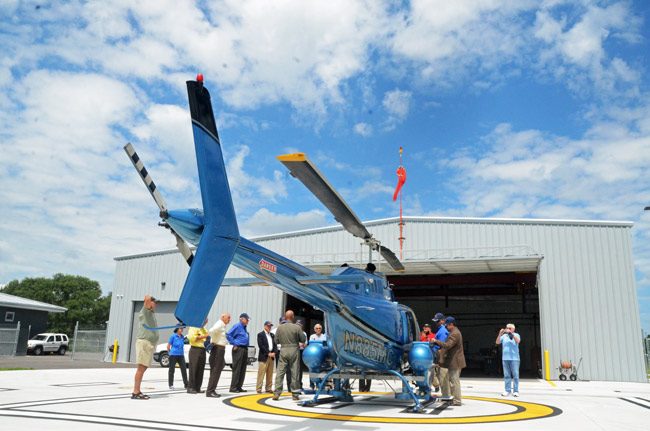
Flagler County’s Mosquito Control is among the least-known local government agencies. So little known that last fall its candidates were left off some 1,600 ballots in the November election. Yet the agency has a very consequential roles: with its ground and aerial sprayings, its surveys and its elaborate testing for viruses, it suppresses the mosquito population, whose potential billions could otherwise make life outdoors unbearable.
It’s also got a three-member elected board, a $1.8 million budget, and its own taxing authority: a typical $175,000 house with a $50,000 homestead exemption pays $30 a year to the district, which extends from U.S. 1 east to the ocean.
Until now, the East Flagler Mosquito Control District has been housed in a small set of offices at 24 Utility Drive in Palm Coast. The offices were functional but cramped and distant from the agency’s key operations, among them its helicopter operations, housed separately at the Flagler County Executive Airport.
Until today.
A little before noon, in a modest ceremony attended by its board, county commissioners and a few others, the mosquito control district marked the opening of its new facility, a 10,000 square foot, $2.1 million building and dedicated helipad at the south end of the county airport, not far east from where the future National Guard building is going up. There’s also a 1,500 square foot building for chemical storage: plenty of room for the agency’s 11 full-time and five part-time employees.
“We have all our equipment, all our labs and everything in one place,” Jules Kwiatkowski, who chairs the mosquito control board, said. That will eliminate a dozen-mile drive between the lab and the previous helipad or other equipment.
“This is the future of mosquito control right here,” says Mark Positano, the district’s operations manager and assistant director. “We are up to date now, we have ample room and the building is in good shape, we can house all of our employees and all of our equipment in one place.”
It’s a lot more than a helipad and a set of administrative offices: mosquito control is more of a monitoring and science lab where mosquito samples, including sentinel chicken flocks and a certain type of fish are all regularly tested for mosquito-borne viruses, which are spread by birds. There are some 48 mosquito types in Flagler. So it’s more complex than just spraying, starting with two surveillance flights a week just to monitor the salt marsh in the county, and at least one treatment a month in the marsh regardless, to keep the larvae down.

There’s no active alert for Zika right now, no current cases. There were two or three in Flagler last year—travel-related cases, as there’s never been locally transmitted cases. Those individuals have recovered.
“But it’s a new season, we’ll probably have more cases, travel-related cases,” Positano said.
The relocation of the helipad will also make airport operations more efficient. “Now I don’t have to take a bunch of air site space over there,” Airport Director Roy Sieger said of the mosquito control operations’ previous location at the airport. “The helicopter, they had no plans to actually go with a fixed-wing aircraft, so we put them here, which is nice, they don’t have to deal with the traffic, they can just launch off the back and stay off the traffic patterns. They can launch underneath the aircraft that are coming and going and can just blast out.”
Kevin Card, the 12-year-old helicopter’s long-time pilot, gave visitors a brief overview of his duties, which entail regular survey flights and, when necessary, spraying. “When they get really bad you can see them from the air, you can see like a mass, a big ball, so it’s pretty impressive,” Card said.
It’s been quiet for past several months because of lack of rain. That’s about to change.
“No water, no mosquitoes,” says Mark Positano, the district’s operations manager and assistant director. “Now that we’ve had a lot of rain, we’ll be having a lot of mosquitoes.” Either way, the district’s workers are constantly monitoring for mosquitoes, though they only treat, or spray, when necessary. “It all depends on the rain. It can happen in January, it can happen in July.”
With the recent rains, which topped 4 inches in parts of Palm Coast, expect to hear a lot more buzzing—that of mosquitoes, and that of their exterminators.





























Anonymous says
What was that about this not being on the ballot? Why not?
dog lover says
its all who you know……….i wish they would just do their job……